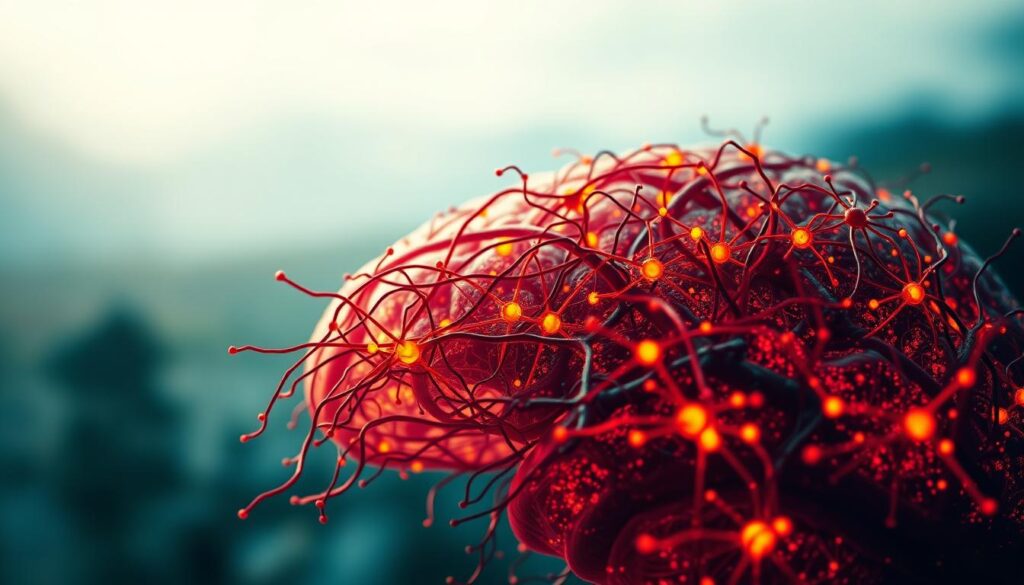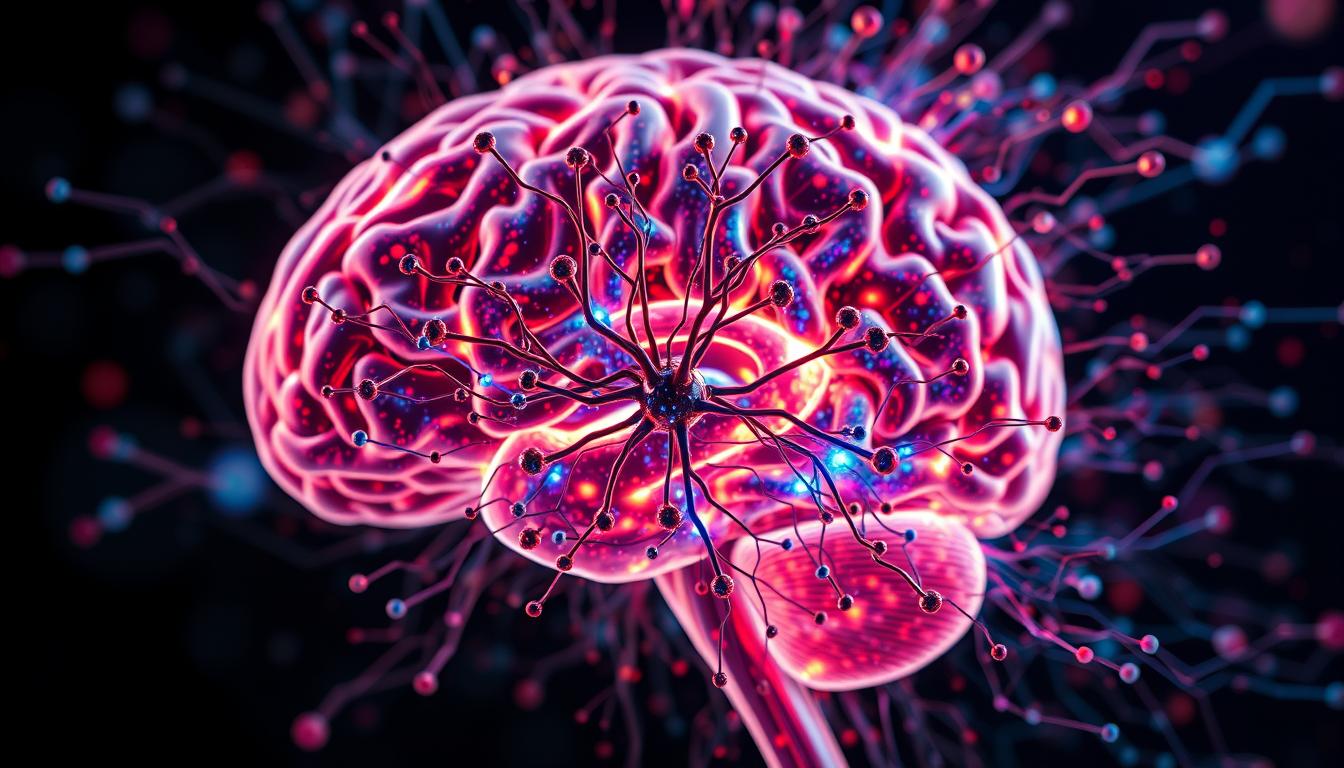Looking into stress responses, it’s clear that everyone reacts differently. My work at invisiblestresslayers.com has taught me the importance of understanding what shapes personalized stress.
The genetic basis of stress response is key. Personal history and individual neurochemistry also play big roles. By recognizing these, we can find better ways to handle stress.
Key Takeaways
- Stress responses are influenced by a combination of genetics, personal history, and individual neurochemistry.
- Understanding the genetic basis of stress response can help in developing personalized stress management techniques.
- Individual neurochemistry plays a significant role in determining one’s stress response.
- Personal history can shape an individual’s stress response.
- Recognizing the factors that influence stress responses can lead to more effective stress management.
The Hidden Nature of Stress in Modern Life
Stress is a big part of our lives, often hidden from our minds. In modern life, we face many stressors that quietly harm our health.
Our bodies react differently to these stressors. It’s key to spot the signs of unrecognized stressors. If we don’t handle stress, it can cause serious health problems. So, knowing how our body responds to stress is crucial.
Signs Your Body Is Responding to Unrecognized Stressors
Look out for changes in how much you eat, sleep issues, and feeling really tired. Noticing these signs can help you find and deal with hidden stress.
By facing and fixing these stressors, you can lessen their harm to your health. Knowing what stresses you out is the first step to managing stress better.
Stress Fingerprints: Why Your Stress Triggers Are Uniquely Yours
Our stress fingerprints are as unique as our fingerprints. They are shaped by our genes, life experiences, and brain chemistry. This makes how we handle stress different for everyone.
Understanding our stress fingerprints helps us manage stress better. It shows that what stresses one person might not affect another. For example, some people might be more sensitive to stress because of their genes.
Case Studies from My Work at Invisible Stress Layers
In my work, I’ve seen how people react differently to stress. Even when they face the same situation, their genes and life stories can change how they feel. One might feel really anxious, while the other stays strong.
Through case studies, I’ve learned that knowing our unique stress triggers is crucial. It helps us create stress management plans that fit each person’s needs.
These case studies show the value of personalized stress management. They prove that our stress fingerprints are as unique as we are.
The Genetic Blueprint of Your Stress Response
The genetics of stress response are complex, involving many genes. Our genes greatly influence how we handle stress. They affect the levels of stress hormones like cortisol.
Key Genetic Factors Influencing Stress Response
- Variations in genes related to neurotransmitter regulation
- Genes involved in the hypothalamic-pituitary-adrenal (HPA) axis
- Genetic variations affecting cortisol regulation
The Role of COMT Gene Variations
The COMT gene codes for an enzyme that breaks down certain neurotransmitters. These include dopamine, epinephrine, and norepinephrine. Changes in the COMT gene can change how well this breakdown happens. This can affect how we handle stress and our mood.
The FKBP5 gene helps control the glucocorticoid receptor, which is key for managing cortisol. Changes in the FKBP5 gene can alter cortisol levels and stress response. This might make some people more prone to stress-related issues.
Knowing the genetic factors behind stress response can lead to better stress management. By finding out about specific genetic changes, like in the COMT and FKBP5 genes, we can tailor our stress management plans. This way, we can handle stress in a way that’s right for us.
Epigenetics: How Life Experiences Modify Your Stress Response Genes
Our stress response isn’t just about our genes. Life experiences also play a big role. Epigenetics is the study of how our environment and life events change gene expression. This happens without changing the DNA itself.
Studies show that life events, like stress or trauma, can change our genes. For example, people who had childhood trauma have different epigenetic markers on stress response genes.

These changes can affect how we make stress hormones, like cortisol. They also impact our ability to handle stress. Knowing about epigenetics in stress response helps us find better ways to manage stress.
Reversibility: Can We Change Our Epigenetic Stress Patterns?
The good news is that some epigenetic changes can be reversed. Research shows that mindfulness, exercise, and therapy can change stress-induced epigenetic changes.
- Mindfulness practices can reduce stress and lead to positive epigenetic changes.
- Exercise can change epigenetic markers related to stress and boost resilience.
- Cognitive-behavioral therapy can help manage stress and reverse negative epigenetic patterns.
By understanding epigenetics and stress response, we can change our gene expression. This helps us better handle stress.
Early Life Experiences and Their Lasting Impact on Stress Resilience
Our early life experiences greatly shape how we handle stress. The events and interactions from our youth can influence our stress response. This affects how resilient we are when facing challenges.
Early life experiences can impact our stress response systems. For example, tough childhood experiences can make us more stressed. This makes it harder to deal with stress as adults.
But, positive early experiences can build resilience. A supportive environment and loving relationships help us handle stress better. These factors aid in developing a healthy stress response.
Healing Early Programming Through Adult Interventions
While early life experiences are important, they’re not set in stone. Adult interventions can lessen the harm of tough early experiences. Some effective strategies include:
- Mindfulness and meditation to lower stress and boost resilience
- Cognitive-behavioral therapy (CBT) to change negative thoughts
- Physical exercise to improve mood and reduce stress
By using these interventions, people can grow and become more resilient. This shows that we can change and improve throughout our lives.
Your Brain’s Unique Stress Architecture
My brain’s stress response is as unique as my fingerprint. It’s shaped by genetics, life experiences, and neural connections. This makes my brain’s stress architecture special and unique.
Neural connections are key in stress processing. The brain’s networks detect and respond to stress. The stronger these networks, the better I handle stress.
The Role of Neural Connectivity in Stress Processing
Studies show neural connections are linked to stress response. For example, the amygdala and prefrontal cortex play roles in emotional and decision-making processes. A strong connection between them helps regulate stress better.
- Neural connections affect how efficiently brain regions communicate during stress.
- These connections can be influenced by genetics, life experiences, and environment.
- Knowing how neural connections work in stress processing helps in finding better solutions.
How Neuroplasticity Offers Hope for Change
Neuroplasticity lets my brain adapt and change with new experiences. Practices like mindfulness and meditation can reshape my brain’s stress response. Neuroplasticity helps me develop better coping strategies and improves my well-being.
“The brain is a highly dynamic and adaptive system, and its ability to reorganize in response to experience is a key factor in its ability to recover from stress and trauma.”
Understanding my brain’s stress architecture, neural connections, and neuroplasticity helps me manage stress better. This knowledge lets me choose the best strategies for my life. It leads to a more resilient and healthier life.
Neurochemical Individuality: Beyond Cortisol
Our neurochemical individuality helps us understand why we react differently to stress. Cortisol gets a lot of attention, but our whole neurochemical profile is key. It shapes how we handle stressful situations.
Many things influence our neurochemical makeup. Genetics, life experiences, and lifestyle choices all play a part. This mix creates a unique neurochemical signature for each of us. It affects how we see and deal with stress.
How Diet and Lifestyle Affect Your Unique Neurochemical Profile
Diet and lifestyle shape our neurochemical profiles. What we eat, how active we are, and how well we sleep all matter. They can change the balance of chemicals in our brains.
- Eating foods full of essential nutrients helps make neurotransmitters. These are key for managing stress.
- Staying active boosts neurotransmitters like serotonin and dopamine. These help control our mood.
- Getting enough sleep keeps our neurochemicals in balance. This ensures our stress response works right.
By choosing wisely about our diet and lifestyle, we can improve our neurochemical profiles. This helps us handle stress better. It’s a personalized way to manage stress, taking into account our unique neurochemical makeup.
In conclusion, knowing and understanding our unique neurochemical profiles empowers us. It helps us find better, more personal ways to manage stress.
Psychological Factors That Shape Your Stress Fingerprint
How we feel and react to stress is very personal. It’s shaped by many psychological factors that make our stress fingerprints unique.
Our past experiences play a big role in how we handle stress. Studies show that past traumas or big life events can change how we see and deal with stress today (PMC11087230).
The Role of Past Experiences in Current Stress Interpretation
Our past shapes how we see the world and react to new challenges. For example, someone who has gone through a traumatic event might see similar situations as very stressful. Even if they’re not really dangerous.

This personal view is a big part of our stress fingerprint. Knowing how our past affects our stress today helps us manage it better. It also helps us find better ways to cope.
By recognizing how past experiences shape our stress, we can tackle the real causes of our stress. This way, we can build a stronger and healthier way to face tough times.
Cultural and Social Influences on Stress Expression
Stress is something everyone faces, but how we deal with it changes a lot. Cultural influences shape how individuals perceive and respond to stressors. Some cultures let people show their stress, while others keep it hidden.
Social influences also matter a lot. The people around us can make our stress better or worse. For example, having friends who support us can help us handle stress. But, being in a stressful place can make it harder.
Cultural Differences in Stress Management Approaches
Every culture has its own way to handle stress. Some use mindfulness and meditation, while others might choose physical activity or community help. Knowing these diverse stress management approaches helps us find better ways to deal with stress.
Dr. Helen Lavretsky said, “Cultural and social factors can significantly impact an individual’s stress response and resilience.” This shows why we should think about culture and society when we talk about stress.
Identifying Your Personal Stress Triggers and Patterns
Finding out what causes your stress is the first step to dealing with it. It’s important to know what triggers stress in you. This means looking into different ways to find your personal stress triggers and how they affect your stress patterns.
There are several ways to find your stress triggers. One good method is keeping a stress journal. This is a type of journaling that logs stressful events and how you react to them. It helps you see patterns and what triggers your stress.

Digital tools can also help track stress and find triggers. These include apps that watch your body’s stress signs and digital journals that give insights into your stress patterns.
Digital Tools Versus Traditional Journaling Approaches
Choosing between digital tools and traditional journaling depends on what you like. Some like writing down their thoughts and feelings by hand. Others like the ease and analysis of digital tools.
- Digital tools offer automated tracking and analysis.
- Traditional journaling provides a more personal and reflective experience.
- Combining both methods can offer a comprehensive understanding of your stress triggers.
By using one or both of these methods, you can learn more about your personal stress triggers. This helps you find ways to manage them better.
Personalized Stress Management: Tailoring Approaches to Your Unique Profile
To fight stress, you need a plan that fits you. This means looking at your body and mind’s special traits. It helps tackle the real stress issues, not just the symptoms.
Biological Interventions Based on Your Neurochemistry
Biological Interventions Based on Your Neurochemistry
Personalized stress management includes biological interventions for your unique brain chemistry. For example, if serotonin affects your stress, you might need to change your diet or take supplements. Learn more about stress factors at The Invisible Secret of Stress.
Psychological techniques that fit your thinking style are also key. Mindfulness, CBT, or relaxation can work well for you. If you like pictures, try visual meditation or guided imagery.
By mixing these personalized approaches, you can make a stress plan that really works. It will not only lower your stress but also boost your happiness.
Embracing Your Unique Stress Response Pattern for Greater Resilience and Wellbeing
Understanding and accepting our unique stress response is key to building resilience and wellbeing. By recognizing how our genetics, personal history, and brain chemistry interact, we can find ways to manage stress better.
This approach lets us work with our stress responses, not against them. This leads to a better quality of life. As we grow in resilience, we can handle life’s challenges more easily. This brings us a deeper sense of wellbeing.
By embracing our unique stress response patterns, we find a more effective way to manage stress. This boosts our overall wellbeing and resilience.
